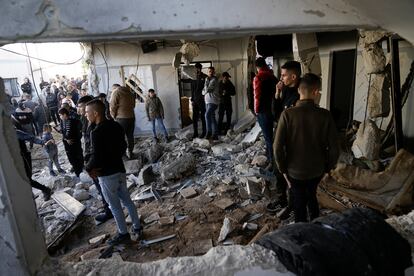Israel intensifies its attacks in the West Bank as it negotiates a new extension of the Gaza truce
Israeli forces arrested more Palestinians in the West Bank early Tuesday morning than they released as part of the hostage-for-prisoner swap, Palestinian sources say


The glimmer of peace that Gaza has regained in the last six days has failed to bring calm to the West Bank. In fact, since the temporary ceasefire between Israel and Hamas went into effect, there has been an uptick of violence in the occupied Palestinian territory, where some of its inhabitants denounce that another war is taking place in the shadow of the conflict in Gaza.
While Hamas said Wednesday that it was open to the possibility of extending the truce in the Gaza Strip — which expires Thursday at 7:00 a.m. local time — for another four days, around 30 Palestinians were arrested by Israeli forces across the West Bank — in Ramallah, Jericho, Nablus and Jenin, according to Abdallah Zgari, president of the Palestinian Prisoners Club NGO. That figure exceeds the number of West Bank and East Jerusalem prisoners released on Tuesday under the hostage-for-prisoner swap included in the Gaza truce. In the city of Jenin alone, the Israeli army carried out a major military incursion lasting more than 16 hours. The city was declared a “closed military zone.”
Despite the umpteenth military incursion in Jenin, a Hamas source quoted by Agence France Presse (AFP) assured that the Palestinian militia has “agreed” to extend the Gaza truce for four more days. This suggests that Hamas is attempting to locate the 161 hostages that, according to the Israeli government, remain in Gaza after being taken during the Oct. 7 attacks. Moreover, an extension of the pact could also mean that adult males and soldiers may be included in the hostage-for-prisoner swaps. The negotiating parties may even consider releasing Palestinian prisoners in exchange for the return of Israeli corpses held by the Palestinian militias. So far, among the 66 Israeli hostages released, there has only been one adult male: a dual Israeli-Russian national. The rest have been women and minors, in addition to the 20 Asian workers released outside of the framework of the Israel-Hamas agreement. Israel, for its part, has released 180 Palestinians, including women and children, since last Friday.
In the time period since the truce went into effect, Israeli forces have arrested nearly as many Palestinians as have been freed: 168, according to Abdallah Zgari. The president of the Palestinian Prisoners Club denounces that Israel also continues to arrest minors, including a 12-year-old boy who, he claims, was arrested on Tuesday night in Ramallah, the capital of the West Bank.
The Egyptian daily Al Arabi Al Jadid reported Wednesday that Hamas and Israel — with the mediation of Qatar, Egypt and the United States — have reached an agreement to extend the truce by at least two days, although neither side has officially confirmed this, beyond the Hamas source quoted by AFP. According to the Egyptian newspaper, which cites official sources, the temporary ceasefire would be extended with conditions very similar to those that have been in force since the truce began last Friday. That is, the cessation of bombing in exchange for the daily delivery of 10 hostages held by Palestinian militias to Israel, which, for its part, would continue to release Palestinian prisoners and allow 200 trucks of humanitarian aid to enter the Strip each day. The United Nations insisted Tuesday night that the amount of aid being allowed into Gaza remains “insufficient.” Before the war, some 500 trucks entered the enclave every day with humanitarian aid and goods.
Israeli officials quoted by the Haaretz newspaper have confirmed that the Israeli government is analyzing the proposal to extend the temporary ceasefire by two days, though it has not yet agreed to it. Nevertheless, the officials quoted by the newspaper maintained that Israel is in no way considering extending the pause in the war beyond Sunday. Mediators, especially Qatar and Egypt, have reiterated that their objective is to make the truce a definitive ceasefire.
CIA director William Burns met again on Wednesday in Doha with David Barnea, head of the Israeli Mossad, to discuss the new phase of the truce, according to a source quoted by Reuters. The United States is trying to decipher whether there is a possibility for the ceasefire to be extended beyond Thursday morning (local time), as well as Israel’s conditions for agreeing to an extension. At a press conference in Brussels, U.S. Secretary of State Antony Blinken said that “looking at the next couple of days,” his country will focus on “doing what we can to extend the pause so we can continue to get more hostages out and more humanitarian assistance [into Gaza].”
The parties are discussing the possibility of exchanging adult male hostages and military personnel of both sexes. This seems indispensable for a somewhat more lasting peace, given that a good number of the civilian women and children held captive — 65 — by the Palestinian militia have already been released and that Israel is making the ceasefire conditional on 10 new hostages being freed every day. According to Israeli government spokesman Eylon Levy, 161 hostages are still being held in Gaza, 141 of whom are Israelis and the rest foreigners.
At the press conference Wednesday, Levy assured that his country would continue to increase “military pressure on Hamas until it releases more” hostages. Israel’s bombing campaign in the Gaza Strip has already killed at least 15,000 people, according to the Gazan health authorities. Those same bombardments also endanger the Israeli hostages being held in the Palestinian territory, some of whom have also been killed in the airstrikes, according to Hamas. On Wednesday, the armed wing of Hamas announced that three hostages had died as a result of an Israeli strike: 10-month-old baby Kfir Bibas, his older brother Ariel, four, and their mother Shiri. Israel responded by attributing “full responsibility for the safety of the hostages” to Hamas.
Israel assures that continuing the war will lead Hamas to release more hostages. The official Israeli narrative further describes this truce as “an operational pause” that will allow better preparation for the next phases of a conflict that Benjamin Netanyahu’s government can hardly give up.
Prime Minister Netanyahu faces, on the one hand, the pressure of honoring his promise to “wipe out Hamas,” an objective that is difficult to achieve given the dual military and political nature of the religious-nationalist movement, the establishment of its social and charitable infrastructure and the impossibility of destroying an ideology with bombs. Beyond this promise, Netanyahu faces the bellicosity of the most extreme right wing of his government. On Tuesday, the Israeli Minister of National Security, the far-right Itamar Ben Gvir, issued a very clear warning via X (formerly Twitter): “Stopping the war = dissolution of the government.”
Closed military zone
While Gaza enjoys a few days of relative peace, the West Bank continues to be engulfed in violence. Especially the localities Israel considers to be at the heart of the Palestinian resistance, such as Jenin, in the northern West Bank, with a population of some 50,000 inhabitants. Of these, between 11,000 and 14,000 live in a refugee camp with an area that does not even cover half a square mile, according to various Palestinian sources.
On Tuesday afternoon, a large number of Israeli military vehicles again penetrated Jenin and the refugee camp located there, while snipers were stationed on rooftops and drones were flying over the buildings, health sources who preferred to remain anonymous told this newspaper. Luz Saavedra, coordinator of Doctors Without Borders (MSF) in Jenin, the only international organization working permanently in the refugee camp and in the city, later confirmed to EL PAÍS that the Israeli military blocked the entrance to the largest public hospital in the city, the Jalil Suleimán, “with military vehicles and snipers” who prevented the wounded from accessing the center’s emergency rooms.
“We even saw storm troopers near the emergency entrance inside the hospital compound,” an act of “significant gravity” that had not been seen “in previous incursions,” Saavedra denounced. MSF says it is that, for the moment, it is unable to give figures on the number of dead or wounded.
“Since October 7,” Dr. Wisam Bakr, director of the Khalil Suleiman Hospital, explained to this newspaper in Jenin, hours before the incursion, Israeli soldiers “do not follow any rules.” Not only do they “prevent the wounded and patients from accessing medical care” during their raids, but they “stop ambulances, search them and take the wounded into custody,” Bakr said. The snipers shoot directly at the hospital, he said. The stairwell windows of the center are riddled with huge bullet holes, apparently of large caliber given their diameter. Attacking hospitals, ambulances and arresting wounded people, even if they are combatants — as long as they no longer pose any danger — can constitute a war crime.
Sign up for our weekly newsletter to get more English-language news coverage from EL PAÍS USA Edition
Tu suscripción se está usando en otro dispositivo
¿Quieres añadir otro usuario a tu suscripción?
Si continúas leyendo en este dispositivo, no se podrá leer en el otro.
FlechaTu suscripción se está usando en otro dispositivo y solo puedes acceder a EL PAÍS desde un dispositivo a la vez.
Si quieres compartir tu cuenta, cambia tu suscripción a la modalidad Premium, así podrás añadir otro usuario. Cada uno accederá con su propia cuenta de email, lo que os permitirá personalizar vuestra experiencia en EL PAÍS.
¿Tienes una suscripción de empresa? Accede aquí para contratar más cuentas.
En el caso de no saber quién está usando tu cuenta, te recomendamos cambiar tu contraseña aquí.
Si decides continuar compartiendo tu cuenta, este mensaje se mostrará en tu dispositivo y en el de la otra persona que está usando tu cuenta de forma indefinida, afectando a tu experiencia de lectura. Puedes consultar aquí los términos y condiciones de la suscripción digital.








































